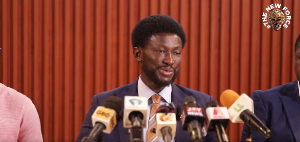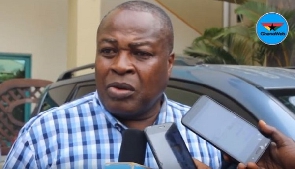Economic freedom has a greater impact than foreign aid in helping people in poor nations escape poverty, according to the Economic Freedom of the World: 2006 Annual Report, by Vancouver-based Fraser Institute.
The research ranks Ghana first in the world for having made the most significant improvement in economic freedom over the last few years.
With 10 being the highest score, Ghana, for instance, has seen its rating moved up from 5.6 in 2001 to 6.3 in 2004, clocking the highest jump for the period, only matched by Barbados and Bulgaria, which moved up from 5.5 to 6.2 and 5.7 to 6.3, respectively, over the same period.
Commenting yesterday on Ghana's superior showing, Finance Minister Kwadwo Baah-Wiredu said it only goes to confirm the World Bank survey which placed Ghana among the top ten improved countries in which to do business.
"It should encourage us to do more. We should not be complacent but let it push us further with a sense of urgency.” The Minister described it as “a credit to all of us.”
The annual report is published in conjunction with the Economic Freedom Network, a group of independent research and educational institutes in over 70 nations, including Ghana"s Institute of Economic Affairs.
The report reveals that economic freedom levels have been rising around the world over the last quarter century, and that is good news for people, particularly for the poorest of the poor.
Economic Freedom of the World measures the degree to which the policies and institutions of countries are supportive of economic freedom.
Ghana’s 6.3 rating places her at 68 in the latest survey of 130 nations. Hong Kong (8.7 points) came first, followed by Singapore in second place, the United States, Switzerland and New Zealand tied in third place, with Ireland and United Kingdom, following in sixth position.
Zimbabwe placed last, with a 2.8 points score.
The executive summary of the EFW survey reads: "Of the five nations that have increased their score by more than 3 points since 1980, two are in Africa. The five nations in order of gain are Ghana, with the largest increase of 4.0 points, Israel, Uganda, Jamaica, and Hungary."
It further reads, "These nations began at a low point of economic freedom and must continue to make progress to enjoy the full benefits of economic freedom."
The researchers conclude that "when the government of a country protects people and their property from the actions of aggressors, enforces contracts in an unbiased manner, and provides a limited set of 'public goods’ like roads, flood control, and money of stable value, but leaves the allocation of other goods and services to the market, the country’s EFW rating will be high."
Economic freedom covers a different sphere of human interaction than political freedom and civil liberties.
The EFW index measures the degree of economic freedom present in five major areas: Legal structure and security of property rights; regulation of credit, labour and business; access to sound money; and, government expenditure, taxes and enterprises.
The Fraser Institute identifies the economic paradigm being followed by Ghana as the best option for economic prosperity. This requires the rule of law, property rights, limited government intervention, freedom to trade and sound money.
Nobel Laureate in economic sciences Milton Friedman, who passed away late last year and was a key figure in the EFW project, wanted to see more focus on economic freedom in developing countries.
According to the Fraser Institute, studies show that greater economic freedom reduces poverty and delivers better economic outcomes.
It said that Africa’s persistent poverty, for example, was not due to a lack of aid — African nations are the largest aid recipients — but to a lack of economic freedom.
One of the most valuable aspects of the Economic Freedom of the World index was that it managed to calculate ratings of 70 countries, including Ghana, going back to 1975. Under Gen I K Acheampong’s military regime, Ghana managed only a score of 3.0.
In 1980, under Hilla Limann’s constitutional rule, economic freedoms, still reeling under the AFRC onslaught on ‘kalabule’ (commercial exploitation), saw it scoring down to 2.3 (up slightly to 2.5 by 1985), and only doubling to 5.1 by 1995.
Apart from Ghana, the other nations that have made substantial gains in economic freedom since 1985 are Hungary, Iceland, El Salvador, Zambia, Poland, Bolivia, Israel, Uganda, Peru, and Nicaragua.
The index, first published a decade ago, identify key ingredients of economic freedom as personal choice, protection of persons and their property from aggression by others, freedom to enter and compete in markets, and voluntary exchange co-ordinated by markets.
In the new research published in last year’s EFW report, economist William Easterly of New York University compares the impact of economic freedom and foreign aid on economic growth in the poorest nations.
"The demand for foreign aid is typically made in the absence of any empirical evidence that it leads to benefits for recipient nations and without asking whether there are better approaches to poverty reduction for the international community to support," said co-author of the report, James Gwartney, Professor of Economics at Florida State University.
"What the research in this edition of Economic Freedom of the World suggests is that economic freedom, rather than foreign aid, does have a powerful positive impact and is a better approach."
Once economic freedom is taken into account, poor nations, far from being caught in a perpetual cycle of poverty, grow faster than rich nations.
"A key component of the success created by economic freedom is the ability toexperiment, find economically successful areas of production, and prune thosethat do not succeed so that resources may be transferred to where they are most productive," said Fred McMahon, The Fraser Institute’s director of trade and globalisation studies.
The rankings of some of the world’s largest economies are Germany (17), Japan (19), France (24), Italy (45), India (53), Mexico (60), Brazil (88), China (95), and Russia (102).
Apart from Ghana, Kenya and Tunisia, all at 68, Namibia (65), Uganda (65), South Africa (53), and Botswana, Africa’s highest placed nation at 35 (with Israel, South Korea, Malta and Latvia), the majority of nations ranked in the bottom fifth are in Africa.
The bottom ten nations are Zimbabwe, Myanmar, the Republic of Congo, DR Congo, Venezuela, Guinea Bissau, Algeria, Burundi, Rwanda and the Central African Republic.
The media release and publication are available at www.fraserinstitute.ca and at www.freetheworld.com.
Click to view details



Business News of Friday, 30 March 2007
Source: Statesman
















